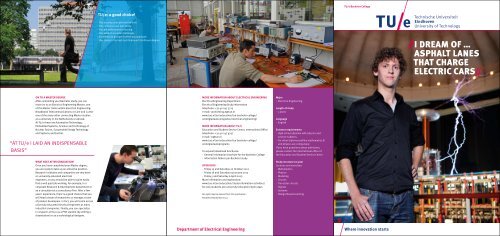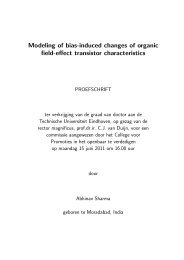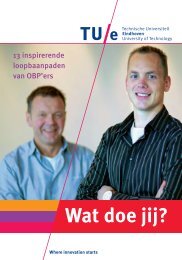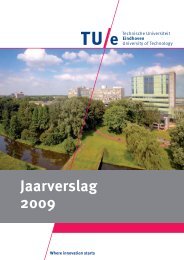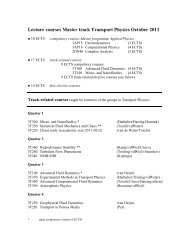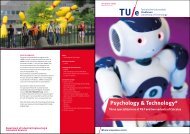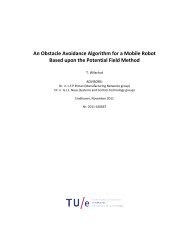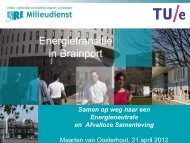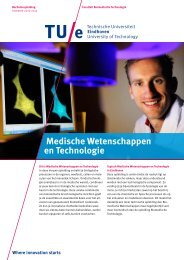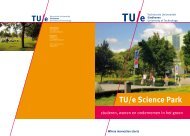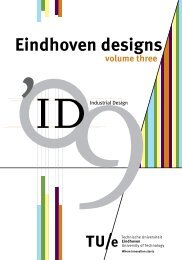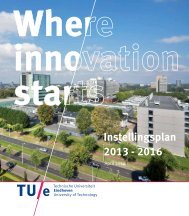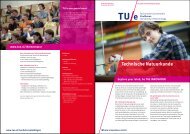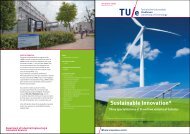Bachelor brochure Electrical Engineering
Bachelor brochure Electrical Engineering
Bachelor brochure Electrical Engineering
You also want an ePaper? Increase the reach of your titles
YUMPU automatically turns print PDFs into web optimized ePapers that Google loves.
TU/e <strong>Bachelor</strong> College<br />
TU/e: a good choice!<br />
- You develop your personal talents<br />
- You compose your own study<br />
- You get professional coaching<br />
- You work on societal challenges<br />
- Excellent job prospects when you graduate<br />
- You study in the high-tech Brainport Eindhoven Region<br />
I dream of …<br />
asphalt lanes<br />
that charge<br />
electric cars<br />
On to a Master degree<br />
After completing your <strong>Bachelor</strong> study, you can<br />
move on to an <strong>Electrical</strong> <strong>Engineering</strong> Master, one<br />
of the Master tracks within <strong>Electrical</strong> <strong>Engineering</strong>:<br />
Broadband Telecommunications or Care and Cureor<br />
one of the many other connecting Master studies<br />
at a university in the Netherlands or abroad.<br />
At TU/e these are Automotive Technology,<br />
Embedded Systems, Science and Technology of<br />
Nuclear Fusion, Sustainable Energy Technology<br />
and Systems andControl.<br />
“At TU/e I laid an indispensable<br />
basis”<br />
What next after graduation?<br />
Once you have completed your Master degree,<br />
you are ready to take up an attractive position.<br />
Research institutes and companies are very keen<br />
on university educated electrical<br />
engineers, so you should be able to quite easily<br />
find a well paid job working, for example, in a<br />
corporate Research & Development department or<br />
as a consultant at a consultancy firm. After a few<br />
years’ experience, there is a good chance that you<br />
will head a team of researchers or manage a team<br />
of product developers. In fact, you will come across<br />
university educated electrical engineers at many<br />
industrial companies. Finally, you can specialize<br />
in research at TU/e as a PhD student (by writing a<br />
dissertation) or as a technological designer.<br />
More information about <strong>Electrical</strong> <strong>Engineering</strong><br />
<strong>Electrical</strong> <strong>Engineering</strong> Department<br />
<strong>Electrical</strong> <strong>Engineering</strong> Study Information<br />
telephone: +31 40 247 3713<br />
e-mail: voorlichting.e@tue.nl<br />
www.tue.nl/en/education/tue-bachelor-college/<br />
undergraduate-programs/electrical-engineering/<br />
More information about TU/e<br />
Education and Student Service Center, International Office<br />
telephone: +31 40 247 4747<br />
e-mail: io@tue.nl<br />
www.tue.nl/en/education/tue-bachelor-college/<br />
undergraduateprograms<br />
To request/download <strong>brochure</strong>s:<br />
- General information <strong>brochure</strong> for the <strong>Bachelor</strong> College<br />
- Information folders per <strong>Bachelor</strong> study<br />
Open days<br />
- Friday 19 and Saturday 20 October 2012<br />
- Friday 18 and Saturday 19 January 2013<br />
- Friday 5 and Saturday 6 April 2013<br />
More information and registration:<br />
www.tue.nl/en/education/study-information-activities/<br />
for-vwo-students-pre-university-education/open-days<br />
No rights may be derived from this publication.<br />
Published September 2012.<br />
Major<br />
- <strong>Electrical</strong> <strong>Engineering</strong><br />
Length of study<br />
- 3 years<br />
Language<br />
- English<br />
Entrance requirements<br />
- High-school diploma with physics and<br />
science subjects.<br />
- For other diploma profiles mathematics B<br />
and physics are compulsory.<br />
If you have questions about admission,<br />
please contact the international office of<br />
the Education and Student Service Center<br />
Study structure 1st year<br />
Lectures and exercises:<br />
- Mathematics<br />
- Physics<br />
- Modeling<br />
- Circuits<br />
- Transistor circuits<br />
- Signals<br />
- Systems<br />
- Design-Based Learning<br />
<strong>Bachelor</strong> College<br />
<strong>Electrical</strong> <strong>Engineering</strong><br />
Department of <strong>Electrical</strong> <strong>Engineering</strong> Where innovation starts
I dream of …<br />
asphalt lanes<br />
that charge<br />
electric cars<br />
The major for those who want to control<br />
the future<br />
<strong>Electrical</strong> <strong>Engineering</strong> is a crucial part in controlling<br />
our future and that is something you can see in<br />
many applications. So you are exposed in your first<br />
year of study to three societal themes:<br />
- Communication (The Connected World):<br />
Like a chip that works using light signals instead<br />
of electrical signals, Bluetooth or WiFi.<br />
- Healthcare (Care and Cure): Medical applications<br />
like an MRI scanner or combating cancer cells<br />
using electromagnetic waves.<br />
- Environment (Smart and Sustainable Society):<br />
Finite sources like oil and gas will be exhausted<br />
at one point. Alternatives are sun and wind.<br />
But the wind doesn’t always blow. How can<br />
energy be stored? How can you store electricity?<br />
institutes in the Eindhoven region. This means<br />
that there are many part-time professors, inspiring<br />
guest lectures, internships and excursions that give<br />
the study that bit extra. The electrical engineering<br />
student association Thor ensures that there are<br />
many other great things you can do with your fellow<br />
students in addition to studying.<br />
Suitable student<br />
Are you mainly keen on science subjects? Are you<br />
inquisitive about the world around you and do<br />
you see things that are needed for improvement?<br />
Do you want to wander off the beaten path, are<br />
you ambitious and do you become inspired by the<br />
thought that your efforts can help make a positive<br />
change in people’s daily lives? Then <strong>Electrical</strong><br />
<strong>Engineering</strong> is something for you!<br />
Alumnus Richard Engelaar<br />
“In my work as a technology consultant at Accenture I don’t use the<br />
intrinsic knowledge from my study on a daily basis yet every day I still have<br />
the feeling that I gained an indispensable foundation at TU/e. The social<br />
skills, the way of thinking, the network you establish there: that certainly<br />
is a benefit in your career. And an internship abroad – I spent six months in<br />
New Zealand – is important; the experience you gain during that period can<br />
be a plus for employers. I have only been working for one and a half months<br />
but I already know that the combination of engineering and business really suits<br />
me. And the variation: as a consultant you see lots of different companies and<br />
organizations from the inside. I will be here for some time yet, I’m sure of that!”<br />
Student Koen Loonen<br />
“We focus on everything in which electricity and magnetism play a role. I think it’s really<br />
extraordinary how much we know nowadays about such complex issues. People used to have no idea.<br />
And now? Now people have solar panels on their roofs, geothermal heat pumps for their homes and<br />
many people make use of home automation, or domotics. Electricity is almost everywhere. In navigation<br />
systems, the GPS network or in wireless chips for your cell phone. That’s all <strong>Electrical</strong> <strong>Engineering</strong>.<br />
Personally, my interest is in control engineering, the control and optimization of large complex systems<br />
like power stations. Sustainability is becoming increasingly important in our field. If I can do my bit, then I<br />
am happy to do so!”<br />
TU/e <strong>Bachelor</strong> College<br />
Eindhoven University of Technology (TU/e) clusters<br />
its <strong>Bachelor</strong> study programs in the <strong>Bachelor</strong> College.<br />
As a student of the TU/e <strong>Bachelor</strong> College you have<br />
the opportunity to shape your study on the basis<br />
of your interests and ambitions. The <strong>Bachelor</strong><br />
consists for the most part of your major, that field<br />
in which you later intend to work as an engineer. It<br />
is the foundation of your study program. This leaflet<br />
tells you more about the contents of the <strong>Electrical</strong><br />
<strong>Engineering</strong> major in relation to the <strong>Bachelor</strong> study<br />
so that you can find out if <strong>Electrical</strong> <strong>Engineering</strong> is<br />
the right choice.<br />
“We focus on everything in<br />
which electricity and magnetism<br />
play a role”<br />
This is <strong>Electrical</strong> <strong>Engineering</strong><br />
<strong>Electrical</strong> <strong>Engineering</strong> plays a role in everything<br />
involving electricity and magnetism. For instance<br />
in the development of electrical motors for cars or<br />
the design of the very latest wireless chips for cell<br />
phones. <strong>Electrical</strong> <strong>Engineering</strong> is crucial in almost<br />
every modern technology: from reading information<br />
on a DVD to signal processing in medical<br />
equipment. At TU/e, for instance, we focus on<br />
wireless energy transfer. What can that mean for the<br />
future? Suppose the battery of your cell phone or<br />
tablet is always fully charged, then you won’t need a<br />
separate charger. And you can use your TV anywhere<br />
because you won’t have to plug it in!<br />
“Sustainability is becoming<br />
increasingly important in<br />
our field”<br />
Typically <strong>Electrical</strong> <strong>Engineering</strong> in<br />
Eindhoven<br />
With more than eighty first-year students <strong>Electrical</strong><br />
<strong>Engineering</strong> in Eindhoven is the biggest university<br />
electrical engineering study in the Netherlands.<br />
Yet <strong>Electrical</strong> <strong>Engineering</strong> remains a relatively<br />
small study program. We provide a stimulating<br />
environment for study in which you build up good<br />
relationships with lecturers and fellow students.<br />
In addition to extensive international relationships,<br />
the department has good contacts with the many<br />
technologically leading companies and research<br />
The <strong>Bachelor</strong> study program<br />
Major<br />
Half of the three-year bachelor study consists<br />
of the chosen major. It is the foundation of your<br />
study. In the <strong>Electrical</strong> <strong>Engineering</strong> major you follow<br />
theory subjects like an introduction to electrical<br />
engineering, signals, networks, electrical and<br />
transistor circuits, systems, electromagnetism<br />
and telecommunication. You also learn to put this<br />
theory into practice in design-based learning (DBL)<br />
assignments that you undertake in a team. You<br />
are taught by lecturers who have earned traces in<br />
research and by part-time professors who also work<br />
in industry.<br />
Basic subjects<br />
In addition to your major, you follow a number of<br />
basic subjects like mathematics and physics, and<br />
you learn engineering design. Professional skills<br />
like cooperation and organization become integral<br />
part of your skills. These subjects give you the solid<br />
foundation you need as an engineer.<br />
Electives<br />
A quarter of your <strong>Bachelor</strong> study program comprises<br />
elective subjects that enable you to accentuate<br />
aspects of your study. You may opt to broaden your<br />
knowledge with subjects from another field or dig<br />
deeper in your own field. The Automotive and Venus<br />
Exploration projects are examples of what you could<br />
choose for your free electives.<br />
USE subjects<br />
Finally, you choose USE subjects, USE meaning<br />
User, Society and Enterprise. These subjects show<br />
how technology always operates in a broader<br />
context. Engineers develop technology for users to<br />
contribute to solutions for societal problems and to<br />
create business opportunities for industry.<br />
Very concrete: the first year<br />
In the first year you learn the basics of <strong>Electrical</strong><br />
<strong>Engineering</strong>. In addition to the basic subjects,<br />
you have electrical engineering subjects (signals,<br />
transistor circuits and systems) and projects.<br />
Theory is explained in lectures. During exercise<br />
sessions, supervised self-study, you exercise with<br />
the material. If you opt for a project in your electives,<br />
you apply the theory to that project. You spend a day<br />
and a half each week on a project. Each academic<br />
year consists of 60 credits (ECTS) and each credit is<br />
equivalent to 28 hours of study. The first academic<br />
year is divided into two semesters of four periods<br />
of eight weeks that you complete with two weeks of<br />
exams.<br />
Intensive coaching<br />
Experienced TU/e coaches offer you personalized<br />
advice from the start to the finish of your study,<br />
beginning during your enrollment when you and your<br />
coach look at the major that best suits you and the<br />
best ways of filling in your electives. In this way you<br />
shape your study program in line with the interests<br />
and ambitions you have. And should you realize<br />
during the first year that a different major suits<br />
you better, then you and your coach look at how<br />
you might be able to switch major during the year.<br />
Additional to a personal coach, you also get help<br />
from a study counselor and senior students who<br />
mentor groups of first-year students of which you<br />
are a member. During your initial period of study,<br />
they can guide you in your study.


